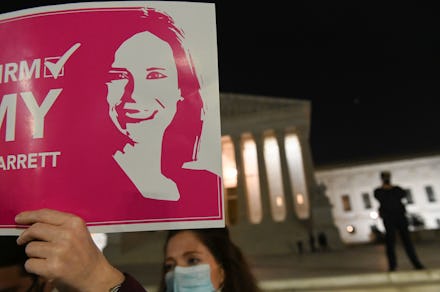The new Supreme Court's first crack at Roe v. Wade could come as soon as Friday

Proponents of abortion access feared that the confirmation of now-Justice Amy Coney Barrett would set the stage for the Supreme Court to severely curtail legal abortion access in America. It looks like they may be right. This Friday — just three days after the presidential election — the Supreme Court will decide whether or not to hear a case regarding a Mississippi law that would ban abortions after 15 weeks.
If the court decides to hear the case, it will be one of the first cases heard by Barrett, who has indicated in the past that she does not believe the landmark judicial ruling Roe v. Wade is settled case law. Her appointment to the Supreme Court shifts the ideological balance on the bench to the right with a 6-3 majority, giving conservatives potential to follow through on President Trump's promise to end legally accessible abortion care in the U.S.
In 2018, the Mississippi legislature passed a law banning abortion at 15 weeks of gestation, in direct violation of Roe v. Wade, which established the constitutional right to an abortion. If the court rejects the case and decides not to hear oral arguments, it will affirm the lower court's 2019 decision, which ruled that the 15-week ban was unconstitutional. "In an unbroken line dating to Roe v. Wade, the Supreme Court's abortion cases have established (and affirmed, and re-affirmed) a woman’s right to choose an abortion before viability," the Fifth Circuit Court of Appeals wrote. "States may regulate abortion procedures prior to viability so long as they do not impose an undue burden on the woman’s right, but they may not ban abortions. The law at issue is a ban."
Missouri, which has one remaining abortion clinic, has a history of attempting to criminalize abortion, one of the safest and most common health care procedures performed in the U.S. In 2019, the state introduced a six-week abortion ban — generally the earliest point in a pregnancy when a person could even realize they're pregnant. That ban was struck down, but was part of the many attempts to criminalize abortion through a bogus medical framework. Even still, access isn't guaranteed in states that don't have abortion bans in place, as some clinics only serve patients up to 12 or 20 weeks of gestation.
Mississippi already has a number of legal abortion restrictions on the books — everything from requiring parental consent for minors seeking to terminate pregnancies to mandating that patients undergo a forced ultrasound of the fetus. Despite these laws, and the desire to impose ideological and so-called religious values on Mississippians, the majority of Americans favor legal and accessible abortion services. Moreover, 1 in 4 women living in the U.S. will have an abortion by age 45, and nearly 2 in 3 patients are already parents themselves.